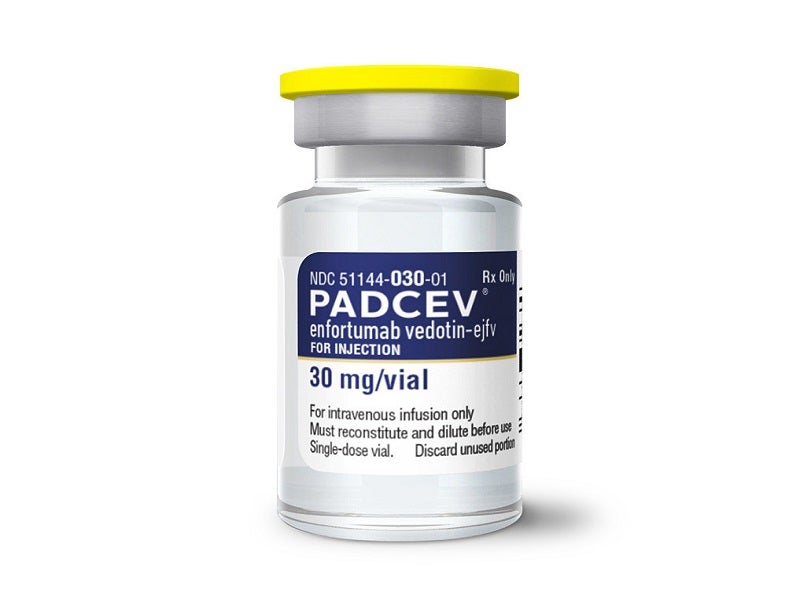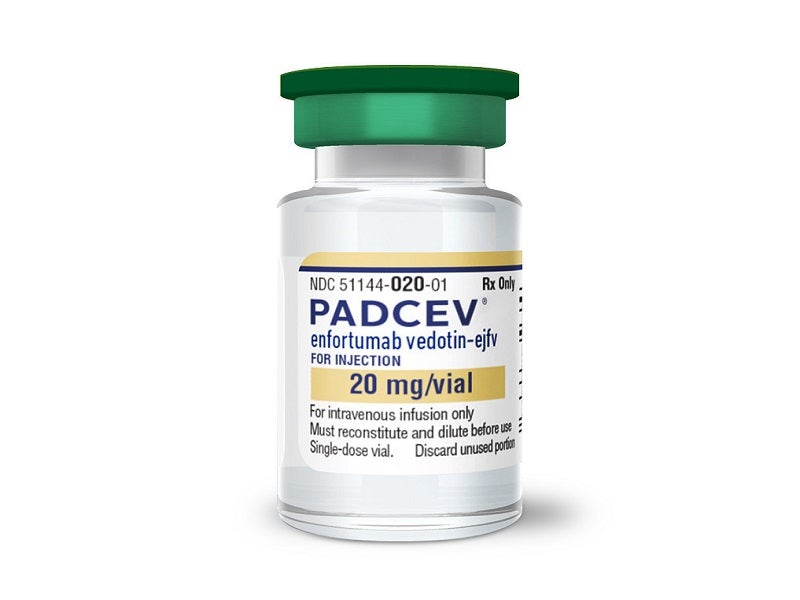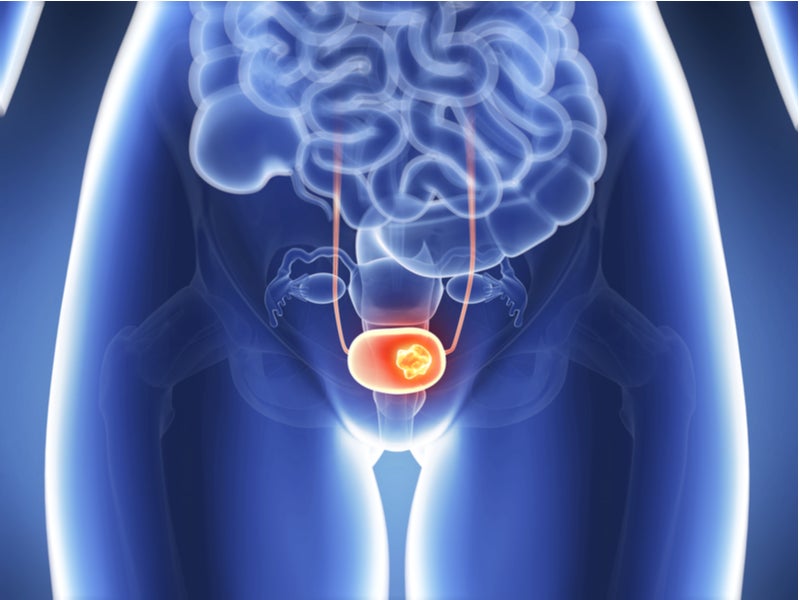Padcev™ (enfortumab vedotin) is the first Nectin-4-directed antibody-drug conjugate (ADC) approved for the treatment of advanced urothelial cancer, the most common form of bladder cancer.
The drug is indicated for locally advanced or metastatic urothelial cancer patients who have previously been treated with platinum-containing chemotherapy or programmed cell death ligand 1 (PD-1) or PD-L1 checkpoint inhibitors, as well as those ineligible for and who have previously received one or more prior lines of therapy.
Padcev was jointly developed by Astellas Pharma and Seattle Genetics under an agreement signed in 2007, with the companies’ collaboration expanded in 2009. The drug received breakthrough therapy designation from the US Food and Drug Administration (FDA) in March 2018.
Padcev is available as a lyophilised powder of 20mg and 30mg strengths in a single-dose vial for intravenous injection after reconstitution. The drug is provided free of cost to uninsured patients to meet the eligibility requirements under the Padcev Patient Assistance Programme (PAP).
Regulatory approvals for Padcev
In July 2019, Astellas submitted a biologics license application (BLA) for enfortumab vedotin to the FDA. The BLA was accepted under Priority Review in September 2019, while the drug received accelerated approval in December 2019, three months ahead of its target action date.
In July 2021, the FDA granted regular approval to the drug and expanded its label for the treatment of adults with locally advanced or metastatic urothelial cancer, who are ineligible for platinum-based chemotherapy and who had previously received one or more prior lines of therapy.
In March 2021, the European Medicines Agency (EMA) accepted a marketing authorisation application for the drug for the treatment of locally advanced or metastatic urothelial cancer.
In September 2021, Padcev received approval from Japan’s Ministry of Health, Labour and Welfare (MHLW) to treat radically unresectable urothelial carcinoma that had progressed after anti-cancer chemotherapy, following a priority review.
Padcev is the first treatment approved for locally advanced or advanced urothelial cancer patients previously treated with platinum-containing chemotherapy or PD-1 or PD-L1 checkpoint inhibitors in Japan.
In April 2022, Padcev received approval in Europe as the first drug for adult patients with locally advanced or metastatic urothelial cancer who have previously been treated with platinum-containing chemotherapy and a PD-1/L1 inhibitor.
Urothelial cancer causes and symptoms
The most common form of bladder cancer, urothelial cancer originates in the inner lining of the bladder cells and causes abnormal tumour growth. It can also occur in other regions of the urinary tract drainage system such as the ureter and urethra.
Urothelial cancer’s most common symptoms are haematuria, pelvic pain, and painful urination. It currently accounts for around 90% of all bladder cancer cases in the US.
The drug is indicated for locally advanced or advanced urothelial cancer patients who have previously been treated with platinum-containing chemotherapy or PD-1 or PD-L1 checkpoint inhibitors.
Padcev mechanism of action
The ADC enfortumab vedotin comprises a Nectin-4 directed human immunoglobulin G1 (IgG1) antibody and a microtubule-disrupting agent, monomethyl auristatin E (MMAE). The antibody connects to the MMAE through a protease-cleavable linker.
Nectin-4 is a cell surface protein highly expressed in bladder cancer patients. The ADC binds to the Nectin-4-expressing cells, causing the internalisation of the ADC-Nectin-4 complex and release of the toxin MMAE by proteolytic cleavage. The release of MMAE into the microtubule network within the cell causes cell cycle inhibition and cell death.
Clinical studies on Padcev
The FDA approved enfortumab vedotin based on results of a pivotal, Phase II, multi-centre, single-arm, open-label clinical trial, EV-201. The study enrolled 125 advanced urothelial cancer patients who had previously received platinum-based chemotherapy or PD-1 or PD-L1 inhibitors.
The study evaluated the anticancer activity and safety of the drug, with the primary goal being to determine the objective response rate (ORR) in patients.
At 10.2 months, the confirmed ORR was 44%, with 12% of patients showing a complete response, while 32% of patients exhibited a partial response to the drug. The median response duration was 7.6 months.
The most common adverse events observed in patients during the study were fatigue, peripheral neuropathy, loss of appetite, baldness, rash, nausea, diarrhoea, dry eye, loss of taste, pruritus, and skin dryness.
A global, Phase III, multi-centre, open-label, randomised confirmatory clinical study, EV-301, was carried out in 608 advanced urothelial cancer patients at 191 centres across 19 countries for supporting registrations worldwide. The cancer trial supported Padcev’s approvals in Japan and Europe. The study determined the overall survival of patients receiving enfortumab vedotin compared with those on chemotherapy.
Patients in the trial were randomly assigned to receive either enfortumab vedotin (301 patients) or chemotherapy of the investigator’s choice (307 patients).
Patients treated with enfortumab vedotin achieved a median overall survival of 12.88 months, compared with 8.97 months in the patients given chemotherapy. Around 51.5% of patients in the enfortumab vedotin group survived, compared with 39.2% in the chemotherapy group at 12 months.
Padcev significantly prolonged progression-free survival in patients with locally advanced or metastatic urothelial carcinoma compared with chemotherapy, lowering the risk of progression or death by 38%.
The most common adverse reactions with enfortumab vedotin were alopecia, pruritus, dysgeusia, anaemia, weight reduction, rash maculo-papular, and increase in aspartate aminotransferase and hyperglycaemia.
ADCs on the market
ADCs are a growing trend within targeted cancer therapies, with seven FDA-approved ADCs currently available on the market.
Seattle Genetics’ Adcetris® (brentuximab vedotin) was the company’s first ADC to receive approval for the treatment of classical Hodgkin lymphoma (cHL) and relapsed systemic anaplastic large cell lymphoma (sALCL) in 2011.
Other ADCs on the market are Pfizer’s Mylotarg® (gemtuzumab ozogamicin) and Besponsa® (inotuzumab ozogamicin), Roche/Genetech’s Kadcyla® (trastuzumab emtansine) and Polivy® (polatuzumab vedotin), and AstraZeneca’s Enhertu® (trastuzumab deruxtecan).





